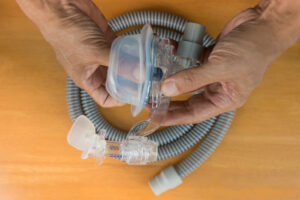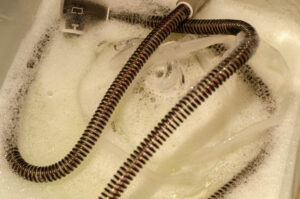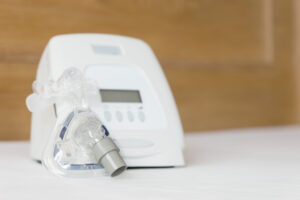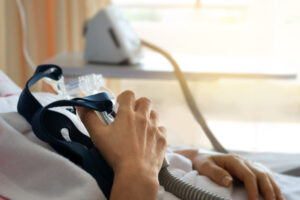Medical Disclaimer: The following should not be used as medical advice or as a recommendation for any specific supplement or medication. It is important to consult your health care provider prior to starting a new medication or altering your current treatment.
Oxygen concentrators and continuous positive airway pressure (CPAP) machines are medical devices that have different roles in managing breathing-related conditions. An oxygen concentrator provides oxygen-enriched air for people with low oxygen levels, while a CPAP machine delivers pressurized air to keep the airway open during sleep.
To highlight the differences between these devices, we’ll explore the core functions of each and when they may be prescribed, then address some commonly asked questions.
What Is the Purpose of an Oxygen Concentrator?
Oxygen concentrators are devices that supply users with nearly pure oxygen by separating oxygen from other gasses in the surrounding air. Unlike oxygen tanks, oxygen concentrators never need to be refilled since they take in air from a person’s environment. Oxygen concentrators are available in both portable and stationary units.
Who Should Use an Oxygen Concentrator?
People with conditions that reduce their blood oxygen levels may benefit from supplemental oxygen, which can be administered through an oxygen concentrator or an oxygen tank. Some of these conditions include:
- Asthma
- Flu
- Chronic obstructive pulmonary disease (COPD)
- COVID-19
- Lung cancer
What Is the Purpose of a CPAP Machine?
CPAP machines are primarily used to treat obstructive sleep apnea (OSA), a condition characterized by intermittent pauses in breathing or shallow breaths during sleep. A CPAP machine works by delivering a continuous stream of air through a mask to keep the sleeper’s airway open, helping to normalize their breathing through the night.
For people with OSA, a CPAP machine can improve sleep quality and reduce the risk of health complications like daytime fatigue, cardiovascular issues, and diabetes. By ensuring that a person’s airway remains open, CPAP machines can also significantly enhance a person’s daily functioning and overall well-being.
Who Should Use a CPAP Machine?
CPAP machines are primarily used to treat sleep-related breathing conditions. Doctors may prescribe a CPAP machine for several types of sleep-related breathing disorders, including:
- Obstructive sleep apnea
- Central sleep apnea
Doctors may also also prescribe a CPAP machine or similar device for people who have other medical conditions that affect breathing, such as:
- COPD
- Heart failure
- Respiratory failure
A CPAP machine is one type of device used to deliver positive airway pressure (PAP) and keep a person’s airway open as they sleep. Other PAP devices that may be prescribed instead of a CPAP machine include bilevel positive airway pressure (BPAP or BiPAP) and automatic positive airway pressure (APAP) machines.
What Are the Differences Between an Oxygen Concentrator and a CPAP Machine?
Oxygen concentrators and CPAP machines have different functions. Oxygen concentrators provide oxygen-enriched air to users, whereas CPAP machines deliver pressurized air to prevent a person’s airway from narrowing or collapsing during sleep.
Will Insurance or Medicare Cover the Cost of These Devices?
Health insurance plans, including Medicaid and Medicare, often provide coverage for CPAP machines and oxygen concentrators. However, people must demonstrate medical necessity through tests or doctor’s recommendations and may be required to show that they use their device consistently to maintain coverage.
Can an FSA or HSA Be Used to Buy Either Device?
Both flexible spending accounts and health savings accounts can be used to purchase these devices, as CPAP machines and oxygen concentrators are considered medical equipment. However, it’s important to verify coverage with the administrator of your FSA or HSA.
Frequently Asked Questions
A CPAP machine ensures constant air pressure to maintain an open airway during sleep, while an oxygen concentrator filters and supplies oxygen-enriched air. Oxygen concentrators are used to treat people with low blood oxygen. CPAP machines are used to treat people whose airways are prone to narrowing or collapsing during sleep.
Oxygen concentrators are not recommended as a stand-alone treatment for obstructive sleep apnea. Doctors may prescribe oxygen therapy in addition to PAP therapy for some people with central sleep apnea, a condition that involves the brain failing to signal the muscles that control breathing.
An oxygen concentrator cannot be used instead of a CPAP machine. Oxygen concentrators are not designed to keep a person’s airway open during sleep. Using an oxygen concentrator without a prescription can be harmful, as too much oxygen can cause oxygen toxicity and lung damage.
Under medical guidance, a CPAP machine can be adapted for use with an oxygen concentrator. Doctors may prescribe both devices for people with overlap syndrome, a term for co-occurring COPD and obstructive sleep apnea. Other medical conditions sometimes treated with this combination of therapies include:
- Central sleep apnea
- COPD
- Heart failure
Ask the Sleep Doctor
Have questions about sleep? Submit them here! We use your questions to help us decide topics for articles, videos, and newsletters. We try to answer as many questions as possible. You can also send us an email. Please note, we cannot provide specific medical advice, and always recommend you contact your doctor for any medical matters.






